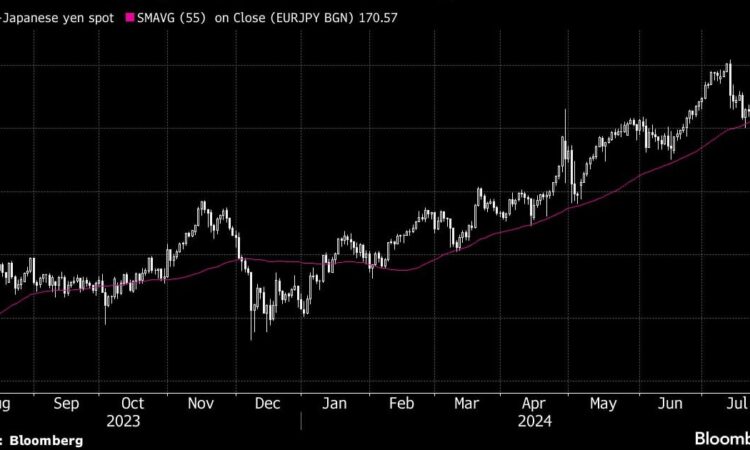Citi Warns of Euro-Yen Intervention Risk If Pair ‘Threatens’ 180 – BNN Bloomberg

(Bloomberg) — Japanese authorities might step into the market and sell the European common currency if euro-yen nears the 180 level, according to analysts at Citigroup Inc.
Euro-yen traded as high as 175.43 on July 11 — a record since the common currency was launched in 1999 — before retreating, with the pair trading around 171 on Tuesday in Tokyo.
The Asian nation likely spent approximately ¥3.5 trillion ($22 billion) on July 11 to prop up its currency against the dollar — marking what appeared to be the third intervention this year. The next day, the Bank of Japan conducted a rate check on the euro-yen pair, followed later by another suspected intervention in dollar-yen. Rate checks typically signal that Tokyo is ready to intervene in the foreign-exchange market.
The euro-yen has climbed about 30 yen per euro since September 2022, when Japan conducted its first intervention in decades to shore up its currency against the dollar’s onslaught. By contrast, the dollar-yen pair trades about 10 yen higher over the period, Citi analysts noted in a research report on Monday.
Investors are on edge in the lead up to the Bank of Japan’s July 30-31 policy meeting, when changes to bond purchases and a decision on whether to raise interest rates will reverberate through currency markets.
“Given the large rise in this currency pair, there is ample probability of intervention in EUR/JPY if the aim is to generate a surprise,” Citi analysts Osamu Takashima, Daniel Tobon and Brian Levine wrote.
If dollar-yen rises to around 165 and euro-yen “threatens” the 180 level,“we would not be surprised” if Japan steps in to sell euro and buy yen, they said.
Citi estimates that 20%-30% of Japanese foreign reserves are held in euros. Since authorities have been selling dollars to defend the yen over the past two years, it makes sense for Tokyo to draw down euros as well to avoid a distortion in reserve allocations, the US bank said.
Historically, Japan has rarely intervened in euros. In one example, in September 2000 it joined a coordinated Group of Seven effort to shore up the common currency. Data from Japan’s finance ministry shows the nation also bought euros and sold yen in May 2003.
BOJ Is Said to See Weak Consumer Spending Complicating Rate Call
Any intervention in euro-yen will probably be on a much smaller scale than in dollar-yen, given the limited trading volumes and liquidity of the former, according to Citi. A greater effect in defending the yen will still come from selling dollars, and Tokyo could do it again as well if dollar-yen revisits the 160-162 area before next week’s Bank of Japan meeting, the analysts said.
–With assistance from Issei Hazama and Brett Miller.
©2024 Bloomberg L.P.
